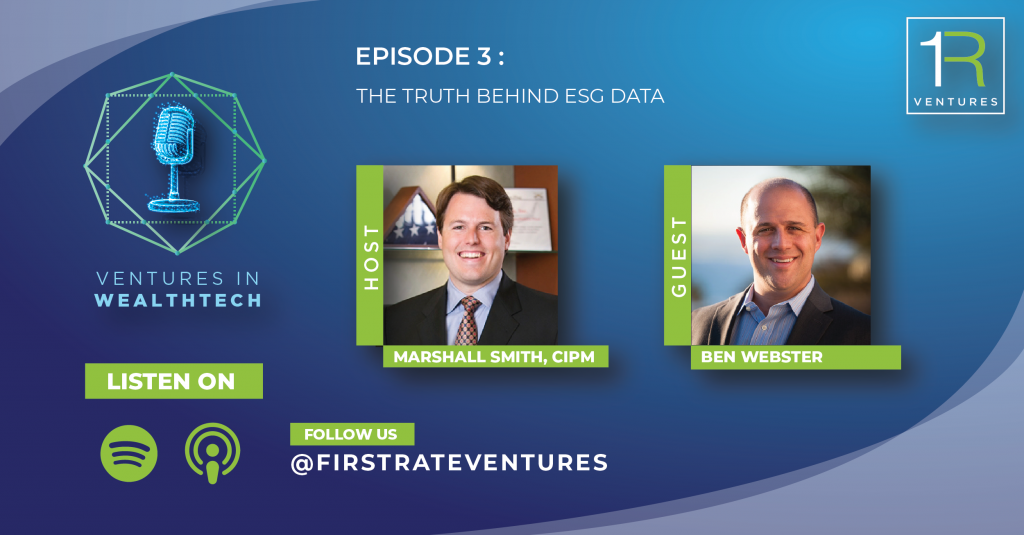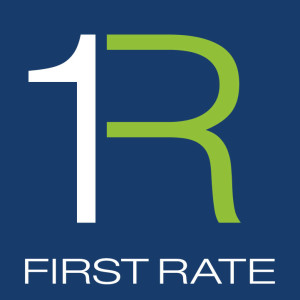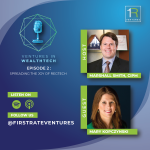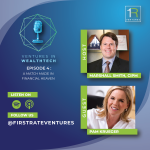The Truth Behind ESG Data

[00:00:03.970] – Marshall Smith
Hello, and welcome to the next episode of ‘Ventures in WealthTech’. I’m your host, Marshall Smith, Managing Director of First Rate Ventures. I’m really excited about this episode. I have my friend Ben Webster joining me today. Welcome to the show, Ben.
[00:00:20.510] – Ben Webster
Hey, thanks for having me. I appreciate you putting this on, Marshall.
[00:00:25.190] – Marshall Smith
Yeah, absolutely. Well, I’m really excited about our topic today. We’re going to be talking about ESG, sustainable investing, hot and controversial topic. But before we jump right into it, Ben, why don’t you give us a brief intro on yourself and what background you bring to the conversation.
[00:00:42.050] – Ben Webster
I appreciate that. Yeah. As you already know, my name is Ben Webster. I’m The CEO of A company called OWL ESG. We are actually an ESG data and analytics company. We’ve been doing this for about a decade now, so I have a lot of experience in ESG. Prior to being one of the founders of OWL, I worked for multiple decades in the financial industry.
[00:01:06.950] – Marshall Smith
Excellent, well great. Well, that’s a great setup for our conversation today. And you know, I had already scheduled this meeting or knew I wanted to have you on the show and have just monitoring Twitter and just seeing what’s going on. And there’s this guy named Elon Musk, and if you haven’t heard about him, he started a little company semi-influential called Tesla. And there was a recent controversy about ESG that Elon was involved in. Actually, it was a text message chain between Bill Gates, founder and former CEO of Microsoft and Elon. And it was captured via screenshot and somehow, I got posted on Twitter and more or less it was Bill Gates texting Elon saying, hey man, I want you to support my climate change agenda. We should do some philanthropy together. And Elon responds back with, hey Bill, are you shorting Tesla right now? And Bill more or less confirms that he’s shorting Tesla, but that shouldn’t mean that they can’t collaborate and cooperate when it comes to climate change and environmental concern, sort of philanthropic strategies. And Elon more or less says, there’s no way I’m going to help you do philanthropy around an area when you’re shorting a company who is arguably doing the most to impact climate change in America with the conversion from the natural resource combustion engines to the Tesla battery engines.
There are other examples with Elon on Twitter, I mean, I’m looking on Twitter right now, Elon is saying ESG is a total scam. There’s another post where he says he has not yet seen a list of ESG companies in quotes that doesn’t have a scam company in it. And so, there’s this whole conversation going on about ESG. Is it a total scam? So, Ben, is ESG a total scam?
[00:03:07.070] – Ben Webster
No, not at all. That doesn’t mean there isn’t truth, some element of truth to what Elon is saying. But ESG is not scammed. ESG at its core is data. It’s data on how well or how a company interacts and affects the environment. It’s data on how a company interacts with its stakeholders, and it’s data with how ethically a company governs itself. Pretty simple. Now, we all know that there’s a difference between having bad data and having quality data. Is all ESG data quality? No. Is all ESG data bad? No. Is some ESG data quality? Yes. And it’s about finding out what ESG data sets have quality, what ESG data sets are showing truth. And what ESG data sets are subjective, biased, or incomplete, missing anything. So, it’s a difficult data set, hands down. There’s some good data, there’s some bad data. At the end of the day, anything that helps you arrive at truth, that’s the good stuff. And that’s what you’re trying to find and what you’re trying to work with.
[00:04:30.170] – Marshall Smith
Yeah. So that’s interesting. I know another topic or term that’s being thrown out a lot is greenwashing. And it’s the idea that it’s taking ESG data and it’s greenwashing it, which is another way of saying like, you’re laundering that data to make it look a certain way when it doesn’t actually represent that. Do you see that? What’s your take on greenwashing?
[00:04:54.270] – Ben Webster
Greenwashing is the concept that companies are disclosing information about themselves, right. To make themselves look more environmentally friendly or socially conscious than they may seem. Now, to be blunt, whether they’re green washing or not, that’s an assumption. So, taking a step back, financial disclosures are regulated. And standardized. For example, there’s something called GAAP accounting, which, you know, right, companies, their financial disclosures are regulated by the Security Exchange Commission to actually follow certain standards, including GAAP reporting, so that anyone is looking to invest in those companies can compare apples to apples in hopefully a truthful way. And there’s third party auditors who are auditing these and these disclosures to verify their truth. The problem is that ESD disclosures are not mandatory right now. Companies are disclosing things about their ESG performance, like their carbon emissions and what have you, or the results of hopefully their diverse hiring practices. Right. But there really isn’t a well-developed system to audit those results to make sure that those companies are telling the truth. And just like anything else, I’m sure there’s a lot of stretching of the truth. There’s probably a lot of truth, and there are probably a lot of things that are just not true. Right. Until the market is developed enough where these disclosures are standardized, they’re regulated, and they’re third-party audited at minimum, there’s going to be a lot of, how you say it, shenanigans going on. Right. So that’s kind of just where I’m at on the issue. It’s a difficult data set to work with because there is no standardization or third-party, or very limited, third-party auditing at this point.
[00:07:10.450] – Marshall Smith
Yeah. So that’s interesting. I know the conservative perspective generally is against regulation. The more progressive perspective is for more regulation, government imposed regulation, and particularly in the financial markets. But I think what you’re getting at here, maybe an area where both conservatives and progressives need to come aligned because what you’re saying is without a regulated way to disclose ESG-related data, you’re going to have people positioning it the way that it makes them look good. And so that’s sort of the greenwashing comment. And from your standpoint, the markets would have more accurate and true representative and comparable data to one another if there were better regulatory rules around ESG disclosures. And would that make conservatives and progressives hold hands and sing to buy out? What are your thoughts?
[00:08:12.530] – Ben Webster
Potentially. So how do I see it? ESG definitely had some overlap with ethics, right? An example is diversity is a big ESG issue, right? And obviously diversity in hiring practices, diversity in the vendors you choose. All across the board, that’s a big issue. Right? But like, this country has this long ongoing debate about affirmative action, right? So, I think if we are required to disclose how diverse our workforce is there may be those in the country that go “well, hey, we don’t want to disclose that”. There’s a certain stance that people think that that is actually unfair and racist. Conservatives may think a lot of them think affirmative action is actually a racist practice themselves whereas progressives say affirmative action is how we equalize things, right, and get more traditionally underrepresented mistreated people, treating them better and giving them opportunity. So how do I say it? I think whichever direction you go, there’s definitely a political minefield that you’ll be stepping in. Now, you may have heard that the SEC is looking to have certain things mandatory – certain climate metrics and climate risks mandatory. They’re going to start to require more and more ESG disclosure. But right now, what my hope is it’s more of a truth in advertising approach, right, where if you’re going to disclose it, it needs to be audited and it’s got to be audited for truth, if you understand what I’m saying.
I hope it’s not, “hey, everybody has disclosed everything” because there will be some major political battles in order to make that happen.
[00:10:38.260] – Marshall Smith
Yeah. So, I want to dig into this whole concept of like digging down a layer deep. So, the affirmative action would fall underneath, maybe the S and ESG so social, which would be under diversity type scoring. So, like under S, there’s maybe four, five, 6,7,10, depending on you calculated different categories. But then under that there are probably dozens of data points for each of those. And so, I guess my question is, where do you see this going into the future? Because I think what it’s been, has been that there are these people in the industry who’ve decided what is ES and G and what is good and bad. Per the point around affirmative, affirmative action, you just gave a good example of depending on how you see that underlying concept, you could say it’s good or it’s bad. So, tell me about the future of ESG. Are we going to continue trusting these people in the industry that tell us if a company is good for ESG or if they’re good on social or if they’re good on an underlying component, or will people essentially be diving down to a deeper level and getting data and making decisions for themselves about that?
[00:11:40.200] – Ben Webster
Yeah, I think there are two things going on, right? There has been an increasing demand for getting access to the underlying data. So, one of the major products in the ESG data industry has been ESG ratings. Right, but ESG ratings has been proven to be highly subjective. One ratings company, let’s take Tesla, for example, can consider Tesla to have a great ‘E’ rating. But another issue ratings firm can have Tesla as a bad rating. Tesla a very bad rating. And I think that’s where the frustration Elon is seeing. While we’re seeing frustration from Elon. That inherent subjectivity ESG Ratings has caused the market in general to go, “Hey, we need to unpack this. We need to actually look at the raw data so you can truly make an apples-to-apples comparison”. So, let’s actually make a comparison on the waste that Tesla generates versus the waste any other company generates, right? You typically have to normalize it like some sort of million dollars of revenue or what have you. But you’re getting access to that raw data actually allows you to get what, as I mentioned earlier, into the truth of the matter, assuming you can trust that raw data and it’s been audited for accuracy.
Right. So, I think the market is going in the direction of getting access to the raw data, but you still have that issue of what’s good or bad. Right, so we move away from the diversity topic, but let’s just look at things like solar, right, versus nuclear. Nuclear for the longest time has been labeled as bad, right? But nuclear has the least waste. It affects the least amount of endangered animal species like wind turbines kill whole populations of birds, right? And solar, we still haven’t figured out how to deal with that waste. And there’s a significant amount of carbon emissions created and carbon used to create those solar panels. So, the problem that what’s going to happen is despite getting access to the data, they’re still going to be those who try to use ESG as a means of controlling people. And that’s my biggest fear. Good or bad, let’s simply label things. Let’s simply label oil companies as bad or fossil fuel companies is bad in Tesla. Elon musk rightly, says if we got rid of all fossil fuels today like just like to snap our finger they’re all gone. Society would collapse. They would collapse.
So, all the things that we depend on, we need oil companies for. However, maybe let’s try to look at an oil and gas company through the lens of maybe they are putting R&D into renewable energy. Maybe they are starting to sell more renewable energy in comparison and put a lot of efforts to growing that part of their business because they know in the long run fossil fuels are not good. Right? And so, I guess where being in the middle of ESG every day and being in the industry and talking to people in government positions. Talking to people who have billions of dollars to allocate. I see how ESG, while I think it’s a wonderful and amazing thing, to help us analyze how the non-monetary effects a company may have on the world through its operations and whether their products or services could be good or bad for the long-term of humanity and figure out how to create a more sustainable future for our children and generations to come.
I think it’s a wonderful thing there, but I think on the flip side it could be a really dangerous thing if people use it as a means of division and as a means of labeling people bad or things bad when a lot of things are in shades of gray and degrees. I don’t think Elon is saying it’s bad to be socially responsible. I don’t think Elon is saying that it’s bad to try to invest more sustainably. I don’t think Elon is saying it’s bad to want to reduce pollution, to increase diversity. He’s not saying that at all. What Elon is saying is don’t bring politics into this, don’t bring bias into this, and don’t use it as a means of division. Let’s get down to the real data and not award and say certain companies are good when they may not be being good, actually doing good for the world but because your bad data says it’s good for the world. That’s what he’s fighting against. He’s looking for truth. I’m not saying Elon is perfect. I’m not saying that he has a monopoly on the truth. But what he’s asking for, I think is let’s get to the truth of this. Let’s get to the real data, the good data, and let’s not use this to demean people or divide people. I think that’s what his sentiment is and I’m all behind that.
[00:17:40.190] – Marshall Smith
Yeah, he’s asking for more debate. He’s wanting it to be debated more fully versus for everyone to be told this is the way and you need to align to that way. And so, he’s pointing out that there may be some agendas with some of the people who are looking for conformity when it comes to ESG environmental concerns, sustainability, etcetera. So that’s the whole debate about the climate deniers and the people who are claiming that this is settled facts and things about climate change and what’s causing it. They’re all these different debates and we’re having all these proxy wars about them while not talking about the actual thing. Well, that’s really interesting. So, you’re a venture company, you’re growing, you’re in this venture space. One question that I like to ask the guests on the show is “how do we think about our values and the impact of running a company in the industry”? At First Rate, we think about clients and our coworkers and our community as the different stakeholders of us running our business and we have our values and we want to live our values to impact those people. But this venture space is known as kind of a competitive space. It’s a cutthroat space. Venture fundraising and raising capital and getting to an exit can be thought of as kind of a brutal space. And so, one thing that I’m asking different people on the episode is just if you could wave a magic wand, you could snap your fingers and change something about the venture funded startup space that would better align the coworkers in the venture companies, venture-backed companies, the customers of the companies like yours and the community you guys are doing business in – what would you change about the venture capital funded startup space to be more values and impact aligned yourself?
[00:19:56.410] – Ben Webster
That’s a good question. I would say that I think venture is a very difficult industry. Venture capital investing specifically. It’s often a graveyard of companies that don’t succeed, right and they’re basing their kind of whole approach to “hey, we’re going to invest in ten companies and eight of these are going to go out of business. One is going to be moderately successful and one is going to be a massive success and that massive success is what’s going to drive those returns”. I think that what’s happened – and you see this in WeWork and a number of the unicorns crash – for a while it’s been a pump and dump game. In order to get those huge unicorns, they need to successively grow larger and larger rounds and try to get someone else to take on the risk, and them selling and capturing their return earlier on. I think there’s got to be venture investing. It’s been a while since I looked at the data but I remember I looked at it a few years ago and I could be wrong here but the average VC firm I think had a 2% annual return when I looked at it.
[00:21:50.770] – Marshall Smith
Yeah.
[00:21:51.400] – Ben Webster
And unfortunately, it’s only those ones that are getting those access to those unicorns. Right. And are pursuing those pump and dump strategies that are getting access to the best deals and getting those massive returns because – well, they don’t all pump and dump, a lot of these companies are great companies – but they’re definitely pushed towards that type of growth. That’s a long way of saying, I think, is there a way for venture capital firms to figure out how to make it so those eight other companies don’t go out of business? How do they figure out a way to help those firms survive longer, give them more runway to figure out how to create jobs, innovate and provide better services in the market that the services need? Now obviously this is easier said than done. I know OWL would not have survived if we didn’t have an investor who was patient and worked his butt off. Actually, he was an angel who worked his butt off to help us find our product market fit. I think if venture capital firms had maybe a longer-term horizon and was able to give companies more runway to be successful instead of pushing growth but figuring out how to make what they’re selling at the fit that needs to be to survive and grow, maybe you’ll have more VCs with more stable returns.
Maybe they’re not going to be getting the ten X’s, but they may get a lot of three X’s right? Yeah, maybe that’s a better model that will create more growth, give more jobs and more positive impact to communities and the economy.
[00:23:48.490] – Marshall Smith
Yeah, that’s great. Well, that’s a great experience that you’ve had with your own investor who’s thought about sustainability of a business and what that means for the long term versus. You use the term pump and dump as kind of an example of trying to pump growth as fast as you can and then get out as fast as you can and where that is the incentive of the capital. I totally agree with you. And we’ve seen all of the stories about companies like, WeWork in others where all the employees are hurt, the communities and businesses around those companies are hurt and the clients of those businesses can be hurt too because they’re left holding the bag. So more of a sustainable approach I think is key and you guys are a living story of that and it’s really cool to see what you guys are doing and you’ve made it to your product market fit and now you’re scaling and hopefully you’ve got a long runway of satisfied employees, satisfied customers and satisfied communities around you where you guys are doing business. So, kudos to you. Well, with that, we’re going to wrap up the episode today.
[00:24:57.830] – Marshall Smith
Really enjoy the conversation. We talked about Elon, Bill Gates pump-and-dumps and venture alignment and capital. So, a lot of fun conversation today. I hope you enjoyed the episode. Thanks for joining today, Ben.
[00:25:11.410] – Ben Webster
It was great. I’d love to talk more about this stuff. It’s a lot of fun.
[00:25:16.750] – Marshall Smith
Yeah. If people want to reach out and connect with you, what’s the best way for them to do that?
[00:25:20.160] – Ben Webster
Then they can go to our website www.owlesg.com. I can also reach Me on LinkedIn and shoot me a message.
[00:25:32.410] – Marshall Smith
All right, great. Talk To You Later. All right.
[00:25:35.040] – Ben Webster
Thank You So Much. Have A Wonderful Day. Bye.
[00:25:37.100] – Marshall Smith
Thank you. Bye.







